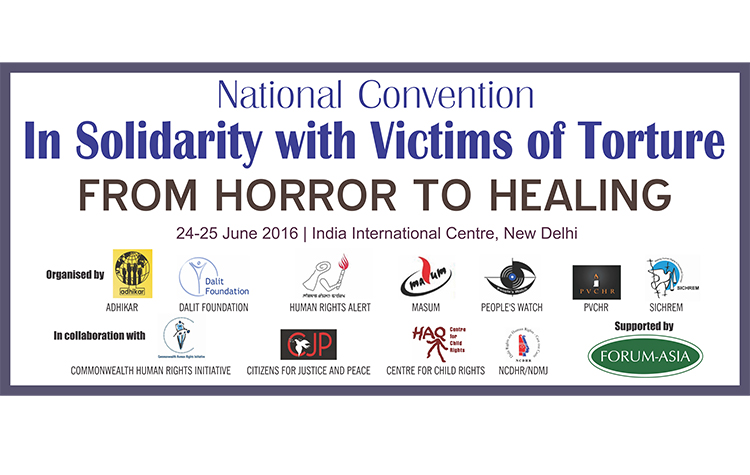From Horror to Healing
Statement of the National Convention In Solidarity with the Victims of Torture
New Delhi, June 24-25 2016
As the world observes June 26 in solidarity with victims of torture, the pervasive existence of torture within India is a crime deserving of the fullest condemnation and punishment. Torture is a pervasive practice that has to be recognised as such and abolished immediately and completely. It goes against India’s international obligations and our Constitution and amounts to a denial of the right to a life with dignity. There must always be assured punishment for perpetrators. For those who survive the humiliating ordeal of torture there must be assured restitution, compensation and rehabilitation. This is the right of every citizen.
Attended by lawyers, doctors, activists, academics and representatives of national human rights institutions (NHRIs) that included the National Human Rights Commission and the National Commission for Backward Classes, participants strongly affirmed the repeated demand that India should without further delay ratify the Convention against Torture (CAT). This has been pending since 1997.
Second, that Parliament immediately enact the Prevention of Torture Bill, incorporating within it the recommendations of the Select Committee of Indian Parliament. This too has been pending since 2010.
Third, India must immediately pass comprehensive statutory scheme for reparation and rehabilitation of torture victims.
Fourth, India must facilitate the visit of the Special Rapporteur on Torture whose request has been pending for many years.
As India is signatory to the Convention against Disability, that also addresses the issue of disabilities caused by torture, a logical and necessary corollary is that India immediately ratifies CAT.
There is now strong evidence of widespread impunity for illegal and appalling actions as a primary means of investigation when in custody and control of state actors and of torture being used as a means of coercing and subduing dissent amongst voiceless and vulnerable populations. These include large sections in the North Eastern region, Jammu and Kashmir, migrant labour, construction workers, unorganised workers, Adivasis and indigenous peoples, Dalits and India’s religious minorities who bear the additional burden of being often wrongfully associated with acts of terror. Within this women and children are especially vulnerable targets. Indeed, it is seldom recognised that children are victims of torture, often in the name of ‘disciplinary action’ in educational, care and custodial institutions
In its comprehensive outcome statement the National Convention appealed to Parliament, state assemblies and the executive to take multiple, specific and practical steps to ensure both the abolition of torture and put in place,at the earliest, effective reparation schemes. It called upon the many monitoring agencies across the country including the courts, special commissions such as the National and state human rights commissions and police complaints authorities to take strong and initiatives required by their mandates to ensure accountability from the perpetrator individuals and institutions. It called upon the police and armed forces in particular to acknowledge the practice and take all steps to eliminate it and punish perpetratos.
Appeal by the National Convention to the Media
Media functions as the fourth pillar of our democracy. We urge it to disseminate the information that there is an absolute prohibition against torture and join in the fight for its elimination. We urge it not to be swayed by shrill slogans of carefully crafted campaigns by perpetrators that are designed to demonise and defame victims and human rights defenders who represent them but to recognise that our Constitutional framework and international obligations require nothing less than the total elimination of this heinous practice against the rule of law to which India is committed.
Please give wide coverage to this statement in your esteemed publication.
(Babloo Loitongbam)
Convener, Organsing Committee




